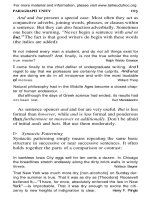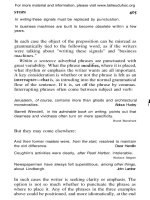Tài liệu Essential guide to writing part 17 docx
Bạn đang xem bản rút gọn của tài liệu. Xem và tải ngay bản đầy đủ của tài liệu tại đây (285.81 KB, 15 trang )
DICTION
charged in such a context. More positive would be "a stout
[or plump] man with rosy cheeks."
Levels of Usage
Levels of usage refers to the kind of situation in which a word
is normally used. Most words suit all occasions. Some, how-
ever, are restricted to formal, literary contexts, and others to
informal, colloquial ones. Consider three verbs which
roughly mean the same thing: exacerbate, annoy, bug. Talking
among your friends, you would not be likely to say, "That
person really exacerbated me." On the other hand, describing
a historical episode you wouldn't (or shouldn't) write, "The
Spartan demands bugged the Athenians." But you could use
annoy on both occasions, without arousing derision in either
friends or readers of your work.
The three words differ considerably in their levels of usage.
Exacerbate is a literary word, appropriate to formal occasions.
Bug (in this sense) is a colloquial, even slang, term appropriate
to speech and very informal writing. Annoy is an all-purpose
word, suitable for any occasion. When in the next chapter we
discuss the practical problem of appropriateness, we shall use
the labels formal, and general to distinguish these
broad levels of usage.
From the more theoretical viewpoint we are taking here,
we may think of level of usage as a peripheral part of a word's
connotation. As with connotation in general, it is not easy to
look up the level of usage of any particular word. Dictionaries
label an occasional term "colloquial" or "slang," but not in
every case; and they do not label formal words like exacerbate
at all. You have to depend on your own knowledge as a guide.
In recent years the line between formal and informal usage
has blurred considerably (though not enough for Spartans to
bug Athenians). The distinction still exists, however, and
careful writers pay attention to it.
For more material and information, please visit www.tailieuduhoc.org
MEANING
of Meaning
Finally, we shall discuss the point with which we
purpose a word is chosen to serve. This aspect we shall call
the "telic mode" of meaning, from the Greek word
meaning "end," and the Latin modus, meaning "manner."
Though the phrase sounds forbidding, it is a useful brief label
for an obvious but important fact: that part of a word's mean-
ing is the purpose it is expected to fulfill, and that words may
serve different purposes.
To get a bit further into this matter it will help to look at
a well-known diagram called the "communication triangle":
The diagram simply clarifies the fact that any act of com-
munication involves three things: someone who communi-
cates (for our purposes, a writer); something the communi-
cation is about (the topic); and someone to whom the
communication is made (the reader). The broken lines join-
ing these elements indicate an indirect relationship between
them.
It is indirect because it must be mediated by words. Di-
rectly, each corner of the triangle connects only to words. The
writer selects them, the reader interprets them, and the topic
is expressed by them. Words thus occupy a central, essential,
mediating position in the triangle:
For more material and information, please visit www.tailieuduhoc.org
DICTION
In selecting his or her words, a writer may be concerned
primarily with any of the three areas of the triangle: writer-
topic, writer-reader, or These areas correspond
to the three modes" of meaning. We shall call them
respectively: "referential," "interpersonal," and "directive."
The Referential Mode
Referential meaning connects writer and topic. In this mode
the writer chooses words the exactness and economy with
which they signify, or refer to, what he or she observes,
knows, thinks, short, what is in his or her mind.
Most writing involves chiefly this mode of meaning. Here are
three examples:
For more material and information, please visit www.tailieuduhoc.org
MEANING
Mary [Queen of Scots] had returned to Scotland in a young
widow of nineteen, after an absence of thirteen years in
France. ... D. Harris Willson
The principle of verification is supposed to furnish a criterion by
which it can be determined whether or not a sentence is literally
Alfred Jules Ayer
Calculus is a lousy subject. student
In all these cases the writers select words for their refer-
ential value, to make clear what is in their minds. The histo-
rian, aiming to be factually accurate, and the philosopher,
aiming to be conceptually exact, chose diction on the basis of
denotation: "in 1561," "a young widow of nineteen," "veri-
"criterion." The student, expressing how he feels,
selects "lousy" for its connotation; and while it would be
more difficult to unravel all the implications of "lousy" than
to explain the meanings of "widow" or "criterion," the word
is exactly right.
In each case, of course, the diction will affect readers' at-
titudes toward both subject and writer, and to that degree the
words will operate in the interpretive and interpersonal
modes. Ayer's abstract diction may well bore people unin-
terested in philosophy, for instance. A mathematician, de-
pending on his sense of humor, might be amused or annoyed
by the student's characterization of calculus. But although
such spillover effects are very real, the fact remains that in all
these examples the diction aims at referential accuracy and
operates primarily in that mode of meaning.
The Interpersonal Mode
We choose words chiefly for their referential meanings. Those
words, however, will also affect the link between readers and
you. It follows that you should select even referential diction
with an eye on the reader. You must consider what readers
know and do not know, how they resemble you and how
For more material and information, please visit www.tailieuduhoc.org
DICTION
they differ, what degree of formality or informality you wish
to establish with them. Such considerations may lead you, for
example, to look for an easier word even though it is a bit
less exact than a technical term.
But beyond showing a general concern for readers in
choosing the words with which you discuss your topic, you
may also wish occasionally to include words that will directly
affect the attitude toward you. Now you are in the
interpersonal mode of meaning.
First, certain expressions create a favorable image of your-
self. Inevitably you exist in your you wish
to or an unseen presence, a hidden voice of which
readers are aware, sometimes dimly, sometimes with acute
consciousness, and which we call the persona (see page 58).
Since a persona is inevitable, you had better strive for an at-
tractive one. Modesty, for instance, is generally a virtue in a
writer. An occasional expression like I think, it seems to me,
to my mind suggests to readers that here is a modest writer,
undogmatic, aware of his or her fallibility. The following pas-
sages illustrate such interpersonal diction (the italics are
added):
What, then, can one learn from [Samuel] Johnson in general? First,
think, the inestimable value of individuality. F. L. Lucas
Whether this of traffic will cause a great or a small
loss of national income is, / am told, a point on which expert econ-
omists are not agreed. Max
That this is so can hardly be proved, but it is, / should claim, a
fact. J. L. Austin
Such personal disclaimers are not always a virtue. At times
modesty may strike a note that is weak or false. At times a
subject may demand an impersonal point of view, making the
use of /, my, me impossible. Even when modesty is called for
and a personal point of view is possible, a few I thinks and in
my opinions go a long way. Used in every second or third
For more material and information, please visit www.tailieuduhoc.org
MEANING
sentence they may well draw too much attention and annoy
the reader. Still, occasionally acknowledging your limitations
is one way of creating a favorable impression upon readers.
Beyond suggesting a nonassertive persona, you
can also use words in the interpersonal mode which gra-
ciously acknowledge your readers' presence. Without being
insincere or obsequious you can draw readers into your ex-
position so that they seem to share more directly in your ideas
and feelings. The judicious use of we, our, us, for instance,
implies a common ground of knowledge and values, subtly
flattering to readers (again, in the examples that follow italics
are added):
Let us define a plot. E. M. Forster
No doubt, if one has more than one self (like most of us), it had
better be one's better self that one tries to become. F. L. Lucas
When we look more closely at this craft of philosophic expression,
we find to our relief that it is less exacting than the art of the true
man of letters. Brand Blanshard
Any words, then, that refer to the writer in the role of
writer or to the reader in the role of reader operate in the
interpersonal mode of meaning. To the degree that such
words create an attractive image of the former and graciously
acknowledge the latter, they will add to the effectiveness of
any piece of writing. In exposition, however, such diction,
while important, necessarily remains infrequent.
The Directive Mode of Meaning
The last of the three modes of meaning relates to the reader-
topic side of the communication triangle. Here you select
words primarily for their value in assisting readers to under-
stand or feel about the topic. Understanding and feeling are
quite different responses: the a function of intelligence,
the other of emotion. Words concerned with facilitating
For more material and information, please visit www.tailieuduhoc.org









